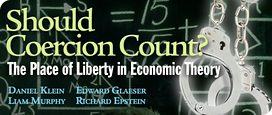If one says that the minimum wage is coercive, is one saying that the law violates the only true rights (e.g., freedom of contract)?
No.
But Liam continues to write as though someone in this exchange says “yes.”
If the law says employers may not pay less than $X, then, obviously, in one significant sense, employers do not have a right to pay less than $X. In another significant sense, they do have a right to pay less than $X.
Furthermore, the law has conferred a right, of sorts, on workers, to not have competitors work legally for less than $X. In that sense, repealing the minimum wage would strip workers of certain rights.
So “rights” come in different sorts, and emerge from different sources. If we want to do this conversation in terms of “rights,” then we need to put a subscript i on “rights,” making it rightsi, where i would correspond to the many different senses or sorts. And we would need to get used to finding them in conflict, and without any one sort being supreme or exclusively “real.”
In that sense, “rights” are highly plural, conflicting, indeterminate.
But the distinction between “voluntary” and “coercive” neither depends on nor necessarily implies a singular well-ordered scheme of rights. Indeed, we can do the distinction without the word “rights” at all (I think I managed pretty well in my essay, for example).
Pretending that the distinction does depend on or imply a singular well-ordered scheme of rights is one way to attack liberty as indeterminate. But it is only a pretense.

